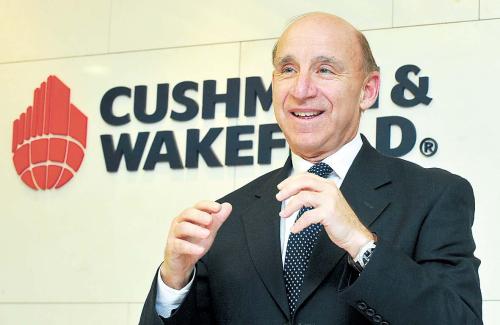[MEET THE CEO] Seoul gateway to growth for Cushman & Wakefield
By Korea HeraldPublished : Jan. 4, 2012 - 00:21
Global brokerage pins high hopes on retail market in Asia
From New York to London to Tokyo, any newcomer business seeks sound and effective investment in office, industrial or retail space to lay a firm footing in the market.
Behind the bets was Cushman & Wakefield Inc., which has been consulting corporate clients on leasing, sales and management services for real estate across the globe for nearly a century.
Since the 1997 opening of its Korean unit, the New York-based brokerage has witnessed the swift emergence of Seoul as an investment hotspot as the country consolidates political and social stability alongside its meteoric economic ascent.
That provided C&W with fresh business opportunities not only in property transactions but also in retail, chief executive Glenn Rufrano told The Korea Herald.
“In the past, Seoul was not considered as a desirable destination for leisure travelling, but now it is strongly considered one of desired shopping destinations among the travelers especially from the nearby Asian countries,” Rufrano said.
From New York to London to Tokyo, any newcomer business seeks sound and effective investment in office, industrial or retail space to lay a firm footing in the market.
Behind the bets was Cushman & Wakefield Inc., which has been consulting corporate clients on leasing, sales and management services for real estate across the globe for nearly a century.
Since the 1997 opening of its Korean unit, the New York-based brokerage has witnessed the swift emergence of Seoul as an investment hotspot as the country consolidates political and social stability alongside its meteoric economic ascent.
That provided C&W with fresh business opportunities not only in property transactions but also in retail, chief executive Glenn Rufrano told The Korea Herald.
“In the past, Seoul was not considered as a desirable destination for leisure travelling, but now it is strongly considered one of desired shopping destinations among the travelers especially from the nearby Asian countries,” Rufrano said.

Korea has recently seen a robust inflow of tourists from China, Taiwan and its Southeast Asian neighbors as the rise of deep-pocketed consumers in the emerging economies boosts demand for luxury goods, air travel and even overseas land.
In Myeong-dong in downtown Seoul, most cosmetics and clothing stores are crammed with shopping travelers. Queues form outside restaurants and cafes. Business hotels thrive, but the city’s room supply still falls short of demand.
“As one of the most desirable destinations among the visitors, Myeong-dong has high potential for accommodating hotels which can be suitable for leisure travelers. And the demand will continue to be strong,” Rufrano said.
The tourism fad, coupled with the shriveling office market here, emboldened C&W to steer its focal point toward retail in recent years.
Armed with a far-reaching pool of industry specialists, the company offers expertise in areas ranging from consumer studies to cost appraisals to development strategies for international retailers that eye the Korean market.
Rufrano, 61, took the helm at C&W in March 2010, orchestrating operations in 60 countries. He was previously the top executive of the Centro Properties Group of Australia.
C&W posted $1.4 billion in sales for the first nine months of 2011, up about 19 percent from a year earlier. Its biggest shareholder is Exor S.p.A., an investment firm owned by Italy’s Agnelli family.
The company aims to double the share of its Asia business to 20 percent of total revenue over the next five years. Of its 1,500 new hires last year, a third came from the region, according to the Seoul office.
The brokerage was also behind the successful landings of global apparel brands such as Zara and H&M here in 2005 and 2010, respectively.
The rapid growth of the fast-fashion houses spurred a transition in a market long dominated by a handful of big department store chains, Rufrano said.
“Since the last few years, the new brands’ power has increased prominently and Korean shoppers are seeking more westernized shopping malls,” he said.
“(In the past) the department store was the almost only place where retail brands including high-end luxury were willing to open their shop other than certain major shopping districts.”
When the multinational brands launched here, department stores were keen to bring them in, he explained. But the deals seemed less lucrative relative to the massive size of the space -- they opted for spacious, multi-story independent shops consequently.
Yet now, major players led by Lotte, Shinsegae and Hyundai are rushing to build mega discount outlets and shopping complexes on the outskirts of Seoul, with the popular labels including Uniqlo assigned separate venues inside.
Korea is a promising and dynamic market but not easy to penetrate largely due to regulatory disparities and the nation’s unique rental regime called “jeonse,” Rufrano noted.
Under the system, tenants pay a lump-sum deposit for a certain term, typically two to three years. Given high property prices in prime locations, he pointed out, many foreign firms -- small and startups in particular -- shy away from Seoul in favor of other cities like Hong Kong and Singapore.
“Sometimes brands have to invest millions of dollars for the deposit for one single shop and when you have the choice of going to another country where this investment is not needed, often Korea loses out,” Rufrano said.
“A system where vastly smaller deposits are paid and a monthly rental system is put in place would make the market far more competitive, lead to better high street mixes and push up rental prices as well as overall land prices.”
By Shin Hyon-hee (heeshin@heraldcorp.com)
-
Articles by Korea Herald









![[Kim Seong-kon] Democracy and the future of South Korea](http://res.heraldm.com/phpwas/restmb_idxmake.php?idx=644&simg=/content/image/2024/04/16/20240416050802_0.jpg&u=)








![[KH Explains] Hyundai's full hybrid edge to pay off amid slow transition to pure EVs](http://res.heraldm.com/phpwas/restmb_idxmake.php?idx=652&simg=/content/image/2024/04/18/20240418050645_0.jpg&u=20240418181020)

![[Today’s K-pop] Zico drops snippet of collaboration with Jennie](http://res.heraldm.com/phpwas/restmb_idxmake.php?idx=642&simg=/content/image/2024/04/18/20240418050702_0.jpg&u=)